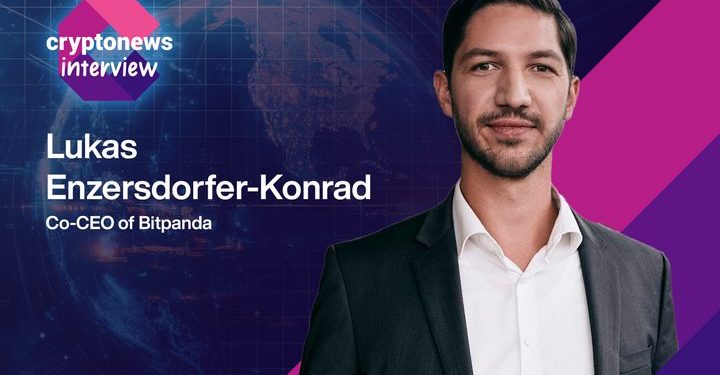Speculation that Bitpanda is preparing to go public has intensified since co-founder Eric Demuth’s comments to the Financial Times about assessing potential listings in New York or Frankfurt, while ruling out London. But co-CEO Lukas Enzersdorfer-Konrad insists no decision has been made.
“We cannot comment on any location. Every company in the crypto industry today needs to decide what their long-term maturity plans are—and an IPO is only one possible option,” he told Cryptonews in an exclusive interview.
He adds that Europe’s shrinking market liquidity poses challenges for any listing. “If we were to consider an IPO, liquidity would be a struggle. Over the last five years, London and others have seen a decline in market activity. Hopefully, that will recover.”
As speculation swirls over a possible Bitpanda initial public offering (IPO), the Vienna-based crypto brokerage is staying tight-lipped on when—or even whether—it will list. Enzersdorfer-Konrad says the company’s focus remains on scaling compliance, technology, and trust in Europe’s post-MiCA environment.
Europe’s Regulatory Clarity Fuels Expansion
With the EU’s Markets in Crypto-Assets (MiCA) framework now active, Bitpanda believes regulatory certainty will accelerate mainstream adoption.
“Regulatory clarity in Europe is finally here with MiCA,” Enzersdorfer-Konrad said. “In the UK, it’s hopefully coming next year, and in the U.S., you can see progress with the Market Clarity and Genius Acts. The UAE already has a very clear framework, which helps us scale globally.”
He adds that Bitpanda is investing heavily in “maturing crypto across society,” expanding in countries such as France, Italy, Germany, the UK, and Eastern Europe to help people see digital assets as more than a high-risk class.
“Blockchain is the underlying technology that enables tokenization, stablecoin applications, and other use cases beyond speculation,” Enzersdorfer-Konrad explained.
Two Business Lines, One Strategy
Bitpanda operates both a retail platform, serving over seven million customers, and a B2B technology business, providing “crypto-as-a-service” for banks and fintechs, such as N26.
“We provide investment and crypto infrastructure to partners like N26, and we’re working with banks globally,” he said.
The company has expanded its B2B offering to Latin America, the UAE, and Asia, operating out of Singapore. While retail remains the dominant revenue stream, Bitpanda expects its B2B business to take on a “significant size” in upcoming financial results, to be published early next year.
Tokenization, RWAs, and Institutional Momentum
On the tokenization of real-world assets, Enzersdorfer-Konrad sees the groundwork being laid by traditional players. Tokenization is the process of converting ownership or rights to a real-world asset — such as stocks, bonds, gold, real estate, art, or even invoices — into a digital token on a blockchain.
“The technology is an enabler. You see pilot initiatives in tokenizing securities and real estate, but real adoption will come when large, traditional institutions—exchanges, clearing houses, custodians—move in, and that’s starting to happen,” Enzersdorfer-Konrad told CryptoNews.
He cites Clearstream, Euroclear, and London Stock Exchange Group initiatives as proof that institutional momentum is building.
Stablecoins: Europe’s Next Big Bet
Bitpanda is also positioning itself in the stablecoin infrastructure market. Stablecoins are crypto-assets pegged to fiat currencies or other assets. They let assets move “on-chain” without the volatility of e.g., BTC or ETH. That makes them ideal for payments, trading, settlements, lending, etc.
“Banks across Europe are exploring stablecoin issuance, and Bitpanda provides the technology for that,” Enzersdorfer-Konrad said.
He confirmed that RAKBANK in the UAE is using Bitpanda’s platform to issue a stablecoin. European partnerships, he added, remain under wraps.
When asked whether Bitpanda might issue its own stablecoin, his answer was diplomatic: “Currently, we do not have anything to announce in that regard.”
Broker, Not Exchange
Enzersdorfer-Konrad stresses that Bitpanda’s structure as a crypto broker, not an exchange, sets it apart from rivals like eToro or Binance.
“We connect to all major liquidity providers to ensure best execution for customers. Our role is to secure the best price, not to compete for liquidity ourselves.”
The company is licensed by BaFin (Germany), the FCA (UK), FMA (Austria), and regulators in the UAE, and plays an active role in EU policy dialogue.
“We’re not just compliant—we are shaping regulation. We’ve been in this space long enough to help authorities understand it,” said Enzersdorfer-Konrad.
Valuation and the Road Ahead
Bitpanda’s last publicly known valuation was €3.4 billion (around $4 billion). The company hasn’t raised new funding since and won’t disclose internal metrics.
As co-CEO, Enzersdorfer-Konrad says his focus for the next year is on trust, product excellence, and infrastructure for institutions. “We’re building the rails that banks and financial institutions will use to connect to blockchain. At the same time, we’re bringing DeFi functionality to retail users in a secure, mass-market UX.”
Bitpanda’s next move—IPO or not—will depend on how the market values trust and compliance in an industry still searching for maturity. “We’ve spent 11 years earning that trust,” Enzersdorfer-Konrad said. “Whatever comes next, it has to strengthen that foundation.”
With nearly a decade of operations across Europe and support from prominent backers, the exchange has positioned itself to follow the playbook and tap global capital markets.
The post Bitpanda’s Lukas Enzersdorfer-Konrad: Every Crypto Company Must Decide Its Long-Term Maturity Path appeared first on Cryptonews.













